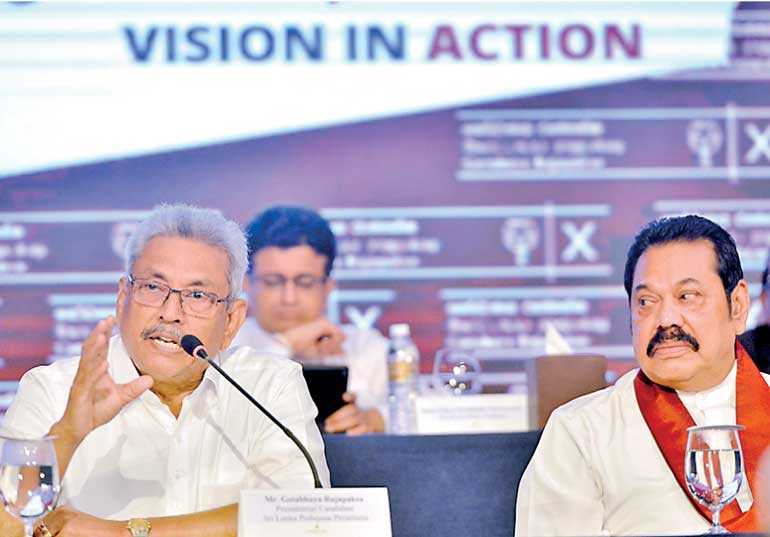Sunday Feb 22, 2026
Sunday Feb 22, 2026
Wednesday, 16 October 2019 01:52 - - {{hitsCtrl.values.hits}}

SLPP presidential candidate Gotabaya Rajapaksa speaks at yesterday’s press conference while Opposition Leader Mahinda Rajapaksa looks on – Pic by Daminda Harsha Perera
GR holds first press conference after being named SLPP’s presidential candidate
Claims UNHRC resolution on SL is not legal document
Says all who surrendered to SLA after war were rehabilitated and reintegrated into society
Pledges to release soldiers in remand custody as they were politically victimised
Charges those involved with white vans now in opposite camp
Says will adopt a non-aligned foreign policy
By Chandani Kirinde
SLPP presidential candidate Gotabaya Rajapaksa said yesterday that he did not recognise the UNHRC resolution co-sponsored by the Sri Lanka Government on ‘Promoting Reconciliation, Accoun-tability and Human Rights in Sri Lanka’ as a legal document and reiterated his public undertaking to release soldiers held in remand custody.
Addressing his maiden press conference since being named a presidential candidate, flanked by former President Mahinda Rajapaksa and United People’s Freedom Alliance (UPFA) General Secretary Mahinda Amaraweera, with the leaders of the SLPP’s other constituent parties in attendance, Rajapaksa addressed a wide range of issues including disappearances that took place during the war, media freedom and foreign policy in a future government led by him.
He said he would always work with the United Nations (UN) but the policies of this Government and his were poles apart.
“I cannot recognise what they (this Government) have signed. My personal view is that this is not a legal document but we will always work with the UN Human Rights Commission (UNHRC) to solve any issues. We have already publicly rejected that agreement (Resolution),” Rajapaksa said.
Asked how he would proceed with the reconciliation process if elected, Rajapaksa said that during their previous tenure in office, they had set in motion a process leading to accountability.
“We found the number of people missing, be they LTTE terrorists or any others. We produced a document based on our findings but foreign investigators, without even listening to us, produced their own reports and numbers. These are very ambiguous documents. We are an independent country and we will follow our own methods without foreign-appointed persons who produce documents without even coming here.”
The SLPP candidate, who served as the Secretary to the Ministry of Defence for the previous regime, also spoke on his controversial statement that he would release all soldiers in custody within 48 hours of being elected president.
“These soldiers and some others are politically victimised. Two very senior officials from the Attorney General’s Department have spoken publicly on the procedures they adopted. Such a decision was made at the headquarters of political parties and at Temple Trees,” he said.
Rajapaksa said that given that proper procedure was not adopted in these cases, there was no justification for holding the soldiers in custody.
When asked about the disappearances of persons who surrendered to the Sri Lanka Army during the end of the war in May 2009, he initially dismissed the question saying he was not the Commander of the Army when this took place but then went on to explain that all 13,784 who surrendered were rehabilitated and reintegrated into society.
“Some were recruited into the Civil Defence Force and the military. It was a very successful program. No other country has such a well-planned rehabilitation program. Even foreign observers commended our program,” he said.
Pressed on the question of missing persons, Rajapaksa said that the issue of missing persons and those who surrendered were two different things.
“More than 3,000 officers and soldiers are missing in the military too. There were certain instances on the battlefield where we couldn’t even recover our own bodies. In the Jaffna Fort there were bodies we couldn’t recover because the intensity of fighting was too high,” he said.
Asked about how he would proceed with the reconciliation process, he said that people in the north and east had more important issues.
“They want jobs, education, roads, etc. We can’t hang on to old things and carry on. We have to move forward. We have to forget about hanging on to old allegations. There is a lot to be done for the betterment of those people.”
He said his Government’s philosophy on reconciliation was to build a society where people could live in dignity.
“We will give every person aspiring for a good living, a good education, access to affordable housing and we will develop each area irrespective of the region or ethnicities.”
Rajapaksa added that the Mahinda Rajapaksa Government should not only be credited with ending the war but also post-war development.
“We pumped a lot of money into the region. The road network, the two railway lines, electricity for every village, drinking water and the rehabilitation of irrigation canals were done. When we took over the Jaffna peninsula, it was like a camp with bunkers all around. Both the LTTE and the military were occupying the land. In 2014, when we handed over the land, more than 90% of the land was released.”
When asked about the safety of journalists and the white van culture that the former regime has become associated with, Rajapaksa denied involvement in any such activities.
“People have forgotten how people were abducted not just in white vans but white lorries in the ’89-’90 period. I have not had any white vans, nor started any white van cultures. The people who did this are on that side now. I can certify not once but twice that no journalists will be harmed,” he said.
Rajapaksa also said his Government would maintain a non-aligned policy. “We have to be a neutral country. We can’t get into the power struggles going on between various countries in this region.”